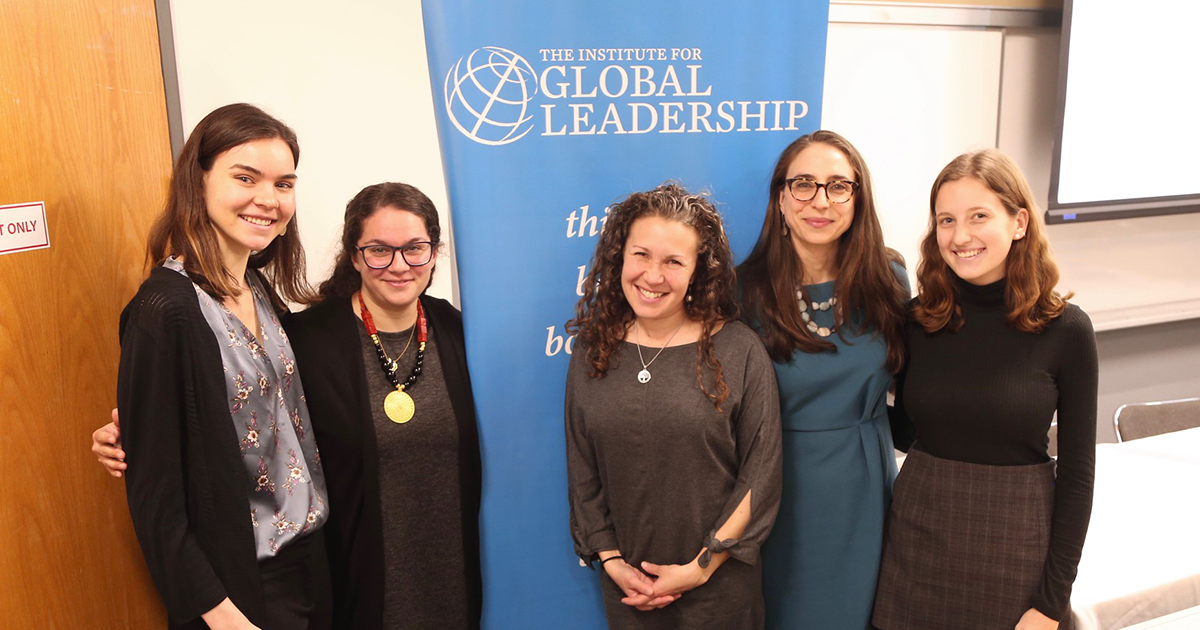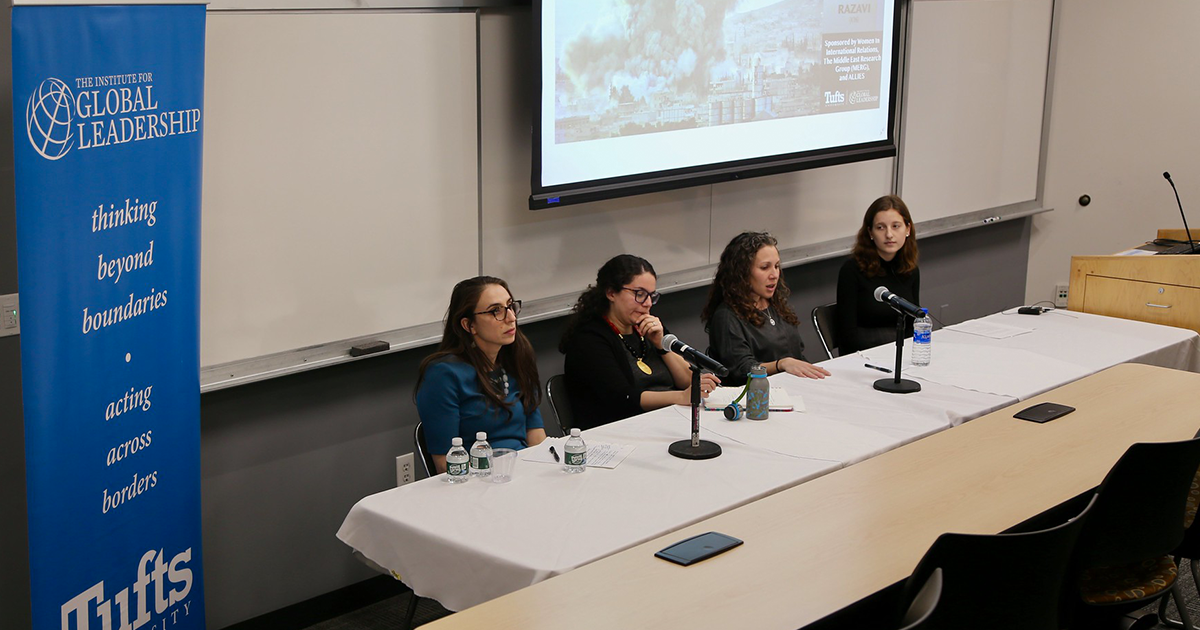The Future of the U.S. in the Middle East

The United States has traditionally taken an active political role in the Middle East and its involvement in the region is always an important issue in a presidential election year. In February, the Tufts Institute for Global Leadership held a discussion on “The Future of U.S. Engagement in the Middle East” featuring three alumna who are experts on U.S. foreign policy towards the region.
Sarah Arkin (A’06), Rachel Brandenburg (A’05) and Negar Razavi (A’06) returned to campus to share their insights on a region that has changed significantly since their undergraduate days.
Ms. Arkin, who had Served in the State Department’s Bureau of Near Eastern Affairs, is currently Policy Director for the Senate Foreign Relations Committee Democratic staff, covering the Middle East and North Africa. Ms. Brandenburg, formerly director of the Iraq and Levant desks at the Pentagon, is now the Senior Policy Adviser for Representative Elissa Slotkin. Dr. Razavi is a political anthropologist whose research specifically examines the role of policy experts and think tanks in shaping U.S. security policies towards Iran and Egypt, and she is a visiting assistant professor at The College of William and Mary.
When they were midway through their college careers, the U.S. invaded Iraq and the Oslo Peace Accords still seemed like they would lead to a two-state solution. Ms. Brandenburg was a co-founder of the New Initiative for Middle East Peace (NIMEP) at the IGL; Dr. Razavi, as part of NIMEP, co-coordinated the first official university trip of a U.S. university to Iran – five undergraduates and five Fletcher students – since the 1979 revolution. All three participated in the IGL’s foundation program, EPIIC (Education for Public Inquiry and International Citizenship).
The panel unfolded as a conversation, with all three discussing the following emerging core trends. All were speaking in their personal capacities, none on behalf of their organizations.

People of the Middle East Have Become the Site of Hope for the Region
While the protests of the Arab Spring (2010-11) changed some societies structurally and affected others not at all, all three women believed that the period changed popular expectations. They said what changed across the board was the notion that the people of the region can and do have a voice and that they want to be heard. They felt encouraged that people from Lebanon, Iraq, and Iran were willing to exercise that voice, even when they have seen it not yield the results they had hoped.
They noted that when they were leaving Tufts in 2005 and 2006, there was still this hope, within the policymaking community, that the United States could do something dramatic to change the region, that the United States would be able to use its military power to reshape the region. They believe that hope has officially died, and that the people of the region have now become the site of hope. The people have come out and said not only do we not want the United States to be intervening, we also don't want Iran to be intervening. Iraqi people are saying “Iraq for the Iraqis.” In Lebanon, the people want all of the corrupt leaders to go, to start over with a clean slate -- a dramatic change from just five to ten years ago.
The United States Is Taking a Back Seat in the Middle East
They all agreed that the Trump Administration has taken a very different approach to foreign policy, in the Middle East and beyond. The emphasis has been on looking for ways to disengage as well as on burden-sharing. This is an experiment, an approach that leaves open such questions as: Can Israel take care of itself when it has an existential threat on its border? What will be the future of the Israeli-Palestinian conflict? Can Europe handle the migration flows by itself? Can Jordan handle this new shake up of its demographics largely by itself? The US is taking a backseat on challenges that ten to fifteen years ago it would have jumped in to assist.
Another aspect they highlighted is the war weariness within the U.S. They said that this belief that the United States can go in and solve a problem, or manage a problem, or use its military power or even its values to positively contribute and change another country has receded from common practice and belief.
How the United States chooses to engage in the region not only changes its impact on the region, but also on how the leadership of the Middle East behaves. Some of the monarchs who have been in power for decades are passing away or handing over power, and it is still too soon to tell what that will mean. With the Trump Administration came a withdrawal of what had been a check on many Middle Eastern leaders. Their worst intentions were often at least curbed a bit by the United States coming in and saying, you can’t do that. Now there are leaders who are somewhat unchecked.
The Palestinian-Israeli Conflict Is No Longer the Lynchpin to Peace in the Region
Fifteen to 20 years ago, there was a common understanding among people who watched the region that solving the Israeli-Palestinian conflict would unlock peace and lay the foundation for much greater stability. This seems to be no longer true. While there are still plenty of people who work on Israeli-Palestinian issues, the Palestinian cause and the Palestinian-Israeli conflict as a lynchpin of stability in the region is no longer the way those conversations happen in policy circles. The traditional constructs are shifting, such as in the rise of a Gulf-Sunni alignment with Israel, to counterbalance Iran.
Not Accepting Common Assumptions
A challenge they posed to the audience is whether or not policymakers and academics and the people of the U.S. are asking the right questions. What are the core assumptions that people take for granted when considering the U.S. presence in the Middle East? What does success look like in the war on terror, because there will always be a group that will use arms to challenge power? Is the U.S. always going to use the full counterterror apparatus in order to combat that? Is the U.S. going to talk about a post-oil economy? Is oil central to U.S. security or not? When considering intervention in Syria, who is the U.S. working with? Who speaks on behalf of the Syrians? Which Syrians? What type of intervention, noting not all Syriasn who want intervention agree on the type of intervention? They said we have to define what U.S. interests are and how are we trying to accomplish them to even begin to define the future of U.S. engagement in the Middle East.
The discussion was sponsored by three IGL programs: Women in International Relations, the Middle East Research Group (MERG) and Alliance Linking Leaders in Education and the Services (ALLIES).
